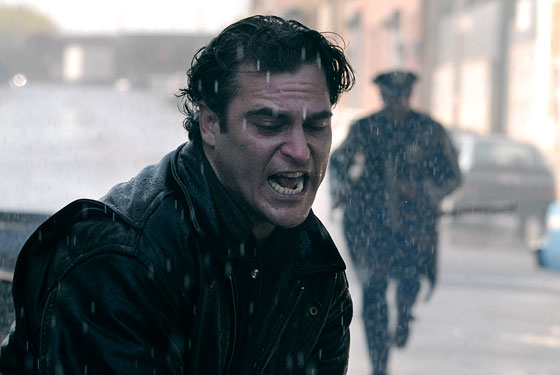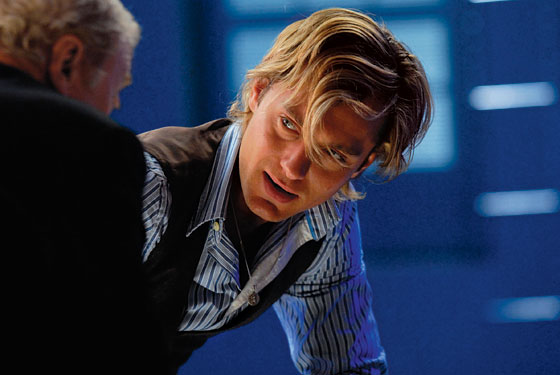
In talking about his cops-versus-Russian-gangsters movie We Own the Night, the writer and director James Gray cites the ancient Greeks’ idea “that one’s life is shaped primarily by forces outside of one’s control, as if the gods had dealt each person a fate—a destiny.” In cinema, though, there’s a thin line between classical destiny and modern formula idiocy. Oedipus’s “destiny” is to kill his father and sleep with his mother; the average movie cop’s “destiny” is to cross the line into bad-guy territory by breaking all the rules to avenge the murder of his fat (or African-American or Asian-American) partner. Gray’s premise is right on the Sophocles/Joe Eszterhas border. The film centers on two brothers—one (Joaquin Phoenix) a druggie and the manager of a shady nightclub, the other (Mark Wahlberg) a cop with a broomstick up his butt. Don’t stop me if you’ve heard this one because you have. The larger question is, If Gray and his (great) actors see destiny where I see cliché, will the strength of their belief make a difference to the finished product—give it a core of authenticity that lifts it out of the B-movie gutter? The answer is a guarded but affectionate yes. We Own the Night plays like gangbusters.
Queens Russian gangbusters—Gray being a native of the borough and of Russian stock. It’s 1988, a high point in the city’s cocaine-fueled devastation, and “We Own the Night” is the slogan of the street-crimes unit, bailiwick of Captain Joseph Grusinsky (Wahlberg). Bobby (Phoenix) hasn’t seen his brother or police-chief dad (Robert Duvall) in months. When he reluctantly shows up for Joseph’s decoration ceremony in a church basement, he’s stoned out of his mind and toting his Latina honey (Eva Mendes) as a shield. That’s when he’s escorted by his dad and a phalanx of officers upstairs, to the chapel, and asked to work undercover, the stakes reflected in the religious icons and the deep-toned pews. Destiny waits.
The casting of Duvall is a kind of shorthand. The actor is so disciplined, so marvelously at ease in his body, that he stands, effortlessly, for the ultimate old-fashioned patriarch: Who could measure up? Not Bobby, who labors to define himself in opposition. Not Joseph, who overcame dyslexia to triumph at the police academy but whose tightness signals inner panic. The brothers are in the same place, only they won’t admit it to themselves or each other.
The conflict might be heavy-handed without Phoenix’s face—his irresolution somehow more powerful than other actors’ resolve. There is no artifice. He’s not an actor disappearing into a role but a man disappearing into himself. Around his dad and brother Phoenix’s Bobby looks physically ill, as if their presence is toxic, a threat to his freedom, even his existence. When he does, ultimately, consent to cooperate, the words seem to come from somewhere other than his head—half-mumbled, half-sighed, as if they’ve been inside him all along. Gray’s idea of character is a little pat for my taste, but Phoenix homes in on the truth of this person. It’s the paradox of the greatest acting: By depicting a man’s struggle to close himself down, he opens himself up wider than any of us would dare.
Apart from its smug villain (Alex Veadov)—another Russian sociopath who hisses things to underlings like “You talk to the police and I rape and disembowel your mother”—We Own the Night has none of the usual genre bombast. There’s little in the way of music—it’s mostly an ambient whine mixed with cars on wet streets and passing planes. The feel is seventies New York realism. That said, the film is considerably more commercial (and splattery) than Gray’s last, The Yards, which was slow, almost groggy: The light seemed unable to pass through air thickened by corruption; the protagonist (Wahlberg again) moved through the bowels of Queens like a somnambulist. Here, we get a car chase.
A different kind of car chase, though. It’s all shot from Bobby’s perspective, behind a windshield in a hard rain and behind the action, too. Even with his foot on the pedal, the deluge makes it seem as if he’s underwater, unable to catch up, unable to alter what he (and we) see coming from the proverbial mile away. Gray knows how to sell the idea of unalterable destiny with a car chase: That’s the mark of a real action director.

Anthony Shaffer’s Sleuth was my first Broadway show, and as a graceless 11-year-old longing to wear a smoking jacket and speak with an English accent, I thought it was surely the most devilishly sophisticated thing ever written. Aging crime novelist Andrew Wyke directs his wife’s young lover, Milo Tindle, to mess up his manor house to make it look as if a burglar has been there; he says to make it “convincing but not Carthaginian.” Convincing but not Carthaginian! Would I ever be able to talk like that? I saw the 1972 movie with Laurence Olivier and Michael Caine over and over and memorized every line, which is why I can tell you that barely a phrase of it remains in Harold Pinter’s adaptation for the new film directed by Kenneth Branagh. Am I outraged? No, my pretensions have evolved. An 11-year-old’s idea of devilish sophistication is a 48-year-old’s idea of arch juvenilia. I’m a Pinter man now. I want chill sexual menace and four-letter words and antagonists who hiss in each other’s faces and use pauses—not pansified purple prose—to emasculate. I want my drama convincing and Carthaginian.
Michael Caine now takes the role of Wyke, and there isn’t a trace of his old co-star’s fruity exuberance. He plays it low-key and simmering, with the twisted sexual sadism of his inquisitor in Quills. This Wyke doesn’t live in a plush old manse filled with circusy bric-a-brac; his house is a starkly lit, high-tech modernist horror with Dalí-esque stairs that lead nowhere and ubiquitous surveillance cameras. The original, likable Milo, a hairdresser who comes, polite and somewhat abashed, to ask Wyke to grant his wife a divorce, is played by Jude Law as an aspiring actor who uses his slim prettiness to taunt his wattled host. It’s hard to have a dog in this fight.
Sleuth is Pinter lite, but that’s not a bad thing: The characters get to the point a lot faster than usual in his work. Shaffer’s Wyke pours a drink and says, with mock casualness, “I understand you want to marry my wife,” and Milo chokes, disarmed by the sudden frankness. Pinter—in the closest thing to a Shaffer formulation—says, “I understand you’re fucking my wife.” “Yes, she’s fucking me.” With these two, what’s afoot isn’t a game: Right off the bat they’re drawing blood and increasingly thirsty for more. As a man of both the theater and the cinema, Branagh has canny instincts; he knows how to shoot from all over the place and yet maintain what classical conductors call “the long line.” The fever builds, as does the homoeroticism, leavened only by the occasional in-joke, like the Alfie of the remake’s pleading to the original, “What’s it all about?”
“What’s it all about?” might be asked of the new Sleuth too. Shaffer’s play had a political context that, however crude, gave it some urgency. At the height of the counterculture, he was trying to expose the snobbish, reactionary, patriarchal bigotry and xenophobia at the heart of the drawing-room English whodunit. Branagh and Pinter don’t have any larger purpose. The project was developed by Law, who clearly relishes the chance to go gaga but doesn’t have the theatrical technique to transform when it’s required. The new twist ending is clunkier than the old one. I think the movie works best if you know the original and have a taste for goofy revisionism—say, Hamlet as a giant Hawaiian luau with the final duel on surfboards, or Paul Anka doing a finger-snapping “Smells Like Teen Spirit.” Actually, Anka does do a terrific “Smells Like Teen Spirit”—I bet Branagh could make a hell of a video.
There was little new in Elizabeth (1998), but the movie had a ripe theatrical conceit that perfectly suited the flamboyant Cate Blanchett. In the face of all the feverish plots and counterplots and religious mania and persecution, the daughter of Henry VIII made a decision to set aside her human longings and become a symbol to stabilize her country: the Virgin Queen. Very tidy, very satisfying, even if Shekhar Kapur’s direction was short on dash. Elizabeth: The Golden Age (the title makes it sound like her Nelson Riddle period) is an unholy mixture of the banal and the bombastic. It’s 1585, and two crises confront the aging queen: The bonkers Philip II (Jordi Mollå) wants to conquer England in the name of the papacy and builds himself an armada, and the wolfishly handsome, unshaven upstart Clive Owen keeps hanging around the court and gumming up Elizabeth’s determination to maintain her divine purity. (Samantha Morton as a loopy Mary, Queen of Scots, is in there somewhere.) Owen plays Sir Walter Raleigh, of do-you-have-him-in-a-can fame, and while Liz waffles, Walt takes up with her cutie-pie lady-in-waiting Bess (Abbie Cornish). If I were Sir Francis Drake, I’d be pissed off at how the movie makes Raleigh the swashbuckling fireboat-launching hero of the big battle. Of course, that armada isn’t much to write home about: It’s a CGI economy job with inserts of cannons firing and probably the same 30 or so extras dodging flaming mizzenmasts. Elizabeth tells a foreign suitor, “I pretend there is a pane of glass between me and them and they can see me but cannot touch me,” and so Kapur often shoots her behind wavy glass. Blanchett drops her voice, stiffens her cheekbones, sends out daggers with her eyes, and rises above the mess—locked in her own battle with Bette Davis, Glenda Jackson, Helen Mirren, and the armada of other Elizabeths that keep her on guard.
We Own the Night
Directed by James Gray. Sony Pictures. R.
Sleuth
Directed by Kenneth Branagh. Sony Pictures Classics. R.
Elizabeth: The Golden Age
Directed by Shekhar Kapur. Universal Pictures. PG-13.
E-mail: [email protected].
